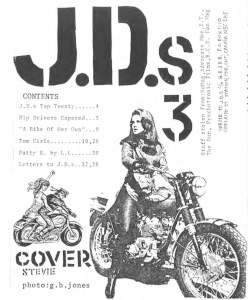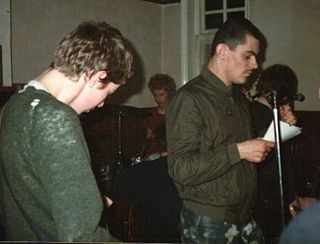
The punk subculture includes a diverse and widely known array of music, ideologies, fashion, and other forms of expression, visual art, dance, literature, and film. Largely characterised by anti-establishment views, the promotion of individual freedom, and the DIY ethics, the culture originated from punk rock.
Anarcho-punk is an ideological subgenre of punk rock that promotes anarchism. Some use the term broadly to refer to any punk music with anarchist lyrical content, which may figure in crust punk, hardcore punk, folk punk, and other styles.
Queercore is a cultural/social movement that began in the mid-1980s as an offshoot of the punk subculture and a music genre that comes from punk rock. It is distinguished by its discontent with society in general, and specifically society's disapproval of the LGBT community. Queercore expresses itself in a DIY style through magazines, music, writing and film.

A punk zine is a zine related to the punk subculture and hardcore punk music genre. Often primitively or casually produced, they feature punk literature, such as social commentary, punk poetry, news, gossip, music reviews and articles about punk rock bands or regional punk scenes.

Bruce LaBruce is a Canadian artist, writer, filmmaker, photographer, and underground director based in Toronto.
Slug and Lettuce is a free newsprint punk zine started in State College, Pennsylvania by Christine Boarts in 1987. In 1989 CBL and S&L relocated to New York City where the zine's print run steadily grew and increased to 10,000 with free worldwide distribution. In 1997, CBL and S&L relocated to Richmond, Virginia. Its byline reads "A zine supporting the Do-It-Yourself ethics of the punk community". The print version ended in 2007 with edition #90, and the PO Box was closed in 2016.

Thomas Daniel Jennings is a Los Angeles-based artist and computer programmer, known for his work that led to FidoNet, and for his work at Phoenix Software on MS-DOS integration and interoperability.
Chainsaw Records is an independent record label run by Donna Dresch that is devoted to Queercore bands. The label is in Portland, Oregon.
Outpunk enjoys the distinction of being the first record label entirely devoted to queer punk bands.
Agitprop! Records is a 'revolutionary hardcore and hip hop' independent record label based in Boston, US, founded by Jacob Tavares. The name comes from the term Agitprop, a genre of political propaganda from Soviet-Russia.

J.D.s was a Canadian queer punk zine which started in 1985 and ran for eight issues until 1991. The zine was co-authored by G.B Jones and Bruce LaBruce and is credited as being one of the first and most influential queer zines. The zine's content was centred around anarchic queer-punk themes and heavily discussed queer-skewed punk music from the late 1980s.

The Apostles are an English experimental punk rock band, who developed within the confines of the 1980s anarcho-punk scene in the UK, but did not necessarily adhere to the aesthetics of that movement.

No Skin Off My Ass is a 1991 comedy-drama film by Bruce LaBruce.
Donna Dresch is an American punk rock musician, perhaps best known as founder, guitarist and bass guitarist of Team Dresch.
Fanorama is a Rhode Island–based zine and zine-distro produced by journalist/activist REB. According to their website it is the "grand-daddy of the queer zine scene".
Leslie Mah is an American musician and performer.
Daniel "Deke" Frontino Elash is an American zine editor, musician, actor, activist and historian.

Martin Sorrondeguy is the singer of American hardcore punk bands Los Crudos and Limp Wrist, the founder of the DIY record label Lengua Armada Discos, and a prominent figure in both the straight edge scene and the queercore scene. He currently does vocals in the band Needles.
G. B. Jones is a Canadian artist, filmmaker, musician, and publisher of zines. She is best known for producing the queer punk zine J.D.s and her Tom Girls drawings.
Fagatron was a short-lived but influential punk rock band in the Queercore movement which gained a small cult following for its emphasis on radical politics and queer identity. It was formed in 1996 by Abe Miner and Jeromy Ogg of Lincoln, Nebraska.








